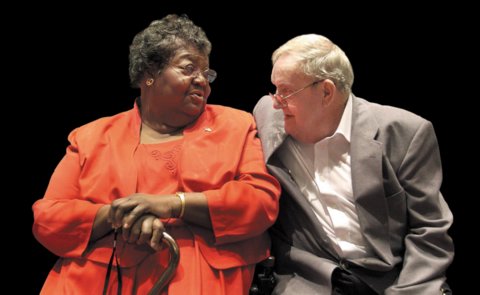Atwater was born in Hillsboro, North Carolina to sharecropper parents. Her father was a deacon in a nearby church and as a child, Ann worked on a nearby white-owned farm to help her family. She married at the age of 14 and moved to Durham, North Carolina for better employment opportunities. Eventually, she became involved in a local anti-poverty program and spoke to her landlord, demanding repairs for her dilapidated house. He surprisingly agreed and she thus became an advocate for better housing and an expert on Durham's housing policies. In 1971, she was invited by the local city council to co-chair a 10-day event called "Save Our Schools," a meeting intended to deal with racial tensions in Durham schools. It was there that she first met C.P. Ellis.
Ellis was born into a poor family in Durham, North Carolina. His father was a mill worker as well as a member of KKK. Ellis married young, had three children and soon found that no matter how hard he worked, he would never have enough money to keep his family in decent condition. He grew bitter and blamed his lack of success on the black population in Durham which led to his entrance into the KKK. The group made him feel like a somebody and gave him some semblance of power. Eventually, he became the Exalted Grand Cyclops, or local leader, of his town and attended city council meetings armed. It was at one of these meetings that he met Ann Atwater.
Over the course of the ten days, the two, seemingly diametrically opposed, came to find that they had more in common than they previously thought. They wanted the same thing: a better future for their children, equal access to opportunity, and a living wage. Both were advocates for their community and, after working with a school group, both realized that most of the problems and suffering was caused by the tension in schools. On the final night of the event, Ellis ripped his Klan card in front of the audience and later formally told the Klan he would no longer be a member. They became life long friends and continued to fight poverty and system racism for many years after.
Years later, this friendship and this story are much needed in a country that is so deeply divided.

Sources:
https://www.theguardian.com/news/2005/nov/18/guardianobituaries.usa
https://www.blackpast.org/african-american-history/atwater-ann-g-1935-2016/
https://www.washingtonpost.com/opinions/2019/03/28/want-unify-country-community-organizer-klan-leader-showed-us-how/?utm_term=.22a4e5c5d029
I find it so interesting how, most often, racial bigotries and prejudices are developed in accordance with one's surroundings, like how Ellis was taught by his father that the black population was the reason for his problems. I also find it so empowering that he was able to identify his own biases and move past them, to become a better person and to develop a lifelong friend.
ReplyDeleteI found this post very interesting, and it's incredible how these two opposites eventually became good friends. Ellis once talked about how he thought Atwater was the meanest person he ever met, but after talking to her, he realized she wasn't a bad person. Hopefully the world can understand that most of the hate they have will just disappear if they talk and they can forget their racist or biased beliefs.
ReplyDeleteSource: https://www.newsobserver.com/living/liv-columns-blogs/past-times/article85852732.html